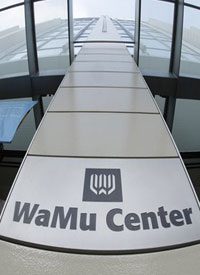
Based in Seattle, WaMu, which was founded in 1889 and had $307 billion in assets, is the largest bank to fail in U.S. history. Like many other troubled financial institutions, WaMu’s condition had been adversely impacted by a heavy load of bad mortgage debt. WaMu’s home loan division went from a profit of approximately $1 billion in 2005 to losing $48 million in 2006. Much of the loss was attributed to the bank having issued sub-prime adjustable rate mortgages that went into default when borrowers could not meet higher payments after the introductory, low-rate period ended. WaMu also suffered large losses in its big credit card loan portfolio.
JPMorgan plans to “write down” WaMu’s loan portfolio by about $31 billion — that is, it will revise the book value of these assets downward to reflect their current market value. “This is a definite win for JPMorgan,” said Sebastian Hindman, an analyst at SNL Financial, who said JPMorgan should be able to absorb the $31 billion write-down to WaMu’s portfolio.
FDIC Chairman Sheila Bair offered reassurance to reporters, including those from AP, in a conference call: “For all depositors and other customers of Washington Mutual Bank, this is simply a combination of two banks. For bank customers, it will be a seamless transition. There will be no interruption in services and bank customers should expect business as usual come Friday morning.”
Free market economist Lew Rockwell had sent up a warning flag about the impending collapse of WaMu on September 17, when he wrote: “As the fraudulent fractional-reserve banks go down, the FDIC ‘insurance’ fund is running out. WaMu will more than empty it.”
While the seizure (at least temporarily) protected the FDIC’s insurance fund from being depleted, the shareholders’ equity in WaMu was wiped out by the action in a single stroke. The debt owed to some of WaMu’s bondholders will also be canceled. Among those losing their investment in WaMu was the TPG private equity firm, and a group of institutional investors who had infused $7 billion of capital into the bank last April.
The fall of WaMu was hastened by its depositors starting to withdraw their assets after the collapse of the giant investment bank Lehman Brothers last week.
WaMu’s brand-new CEO, Alan H. Fishman, who has held his position for less than three weeks, apparently knew nothing about the JP Morgan deal. However, he will survive handsomely. Fishman is eligible for $11.6 million in cash severance and will get to keep his $7.5 million signing bonus.



